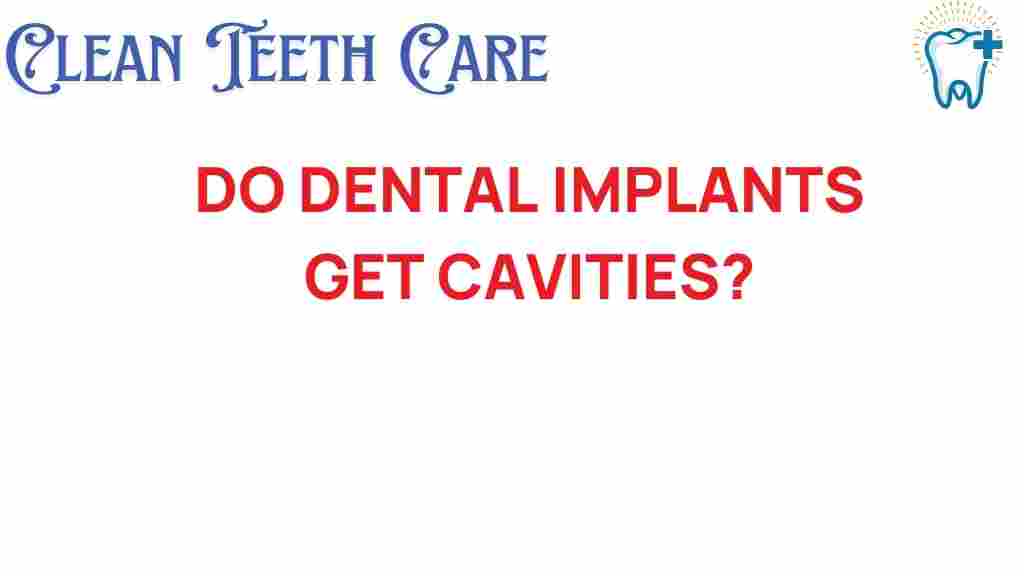Do Dental Implants Get Cavities? Unveiling the Truth Behind Oral Health
Dental implants have revolutionized restorative dentistry, providing a durable solution for those who have lost teeth. However, many patients wonder about the implications of dental implants on their oral health, particularly regarding cavities. In this article, we’ll delve into whether dental implants can get cavities, how they affect oral health, and the best practices for maintenance and prevention.
Understanding Dental Implants
Before we address the question of cavities, it’s essential to understand what dental implants are. A dental implant consists of three main components:
- Implant Post: A titanium post surgically placed into the jawbone, acting as the root of the artificial tooth.
- Abutment: A connector that holds the crown (the visible part of the tooth) securely in place.
- Crown: The prosthetic tooth that mimics the appearance and function of a natural tooth.
Dental implants offer strength and stability, making them a popular choice for tooth replacement. They also help maintain jawbone health and prevent further tooth loss.
Do Dental Implants Get Cavities?
The short answer is no; dental implants do not get cavities. Cavities are caused by tooth decay, which results from the bacteria in plaque producing acids that erode the enamel of natural teeth. Since dental implants are made of titanium and porcelain, they do not have enamel and, therefore, cannot develop cavities in the traditional sense.
However, it’s crucial to understand that while dental implants themselves cannot get cavities, the surrounding natural teeth can still be susceptible to decay. Additionally, the gums and bone around dental implants can be affected by other oral health issues, such as gum disease.
Oral Health and Dental Implants
Maintaining excellent oral health is vital when you have dental implants. The success of dental implants largely depends on the health of the surrounding tissues. Here are some key points to consider:
- Gum Disease: If gum disease develops around the implant, it can lead to complications, including implant failure.
- Hygiene Practices: Proper hygiene is crucial for both the implants and natural teeth. Regular brushing, flossing, and dental check-ups are essential.
- Regular Dental Care: Routine dental visits help monitor the health of your implants and surrounding tissues.
Maintenance of Dental Implants
To ensure the longevity and success of your dental implants, follow these maintenance tips:
- Daily Brushing: Brush your teeth at least twice a day with a soft-bristled toothbrush and non-abrasive toothpaste.
- Floss Regularly: Use dental floss or interdental brushes to clean between your teeth and around the implant.
- Use Antimicrobial Mouthwash: Rinsing with an antimicrobial mouthwash can help reduce plaque buildup around implants.
- Regular Dental Visits: Schedule check-ups every six months for professional cleaning and examination.
Preventing Gum Disease Around Dental Implants
Gum disease is a significant concern for implant patients. Here are some preventive measures:
- Quit Smoking: Smoking can hinder healing and increase the risk of gum disease.
- Healthy Diet: Eat a balanced diet rich in vitamins and minerals to support oral health.
- Hydration: Stay hydrated to maintain saliva production, which helps protect your teeth and gums.
Common Issues with Dental Implants
While dental implants are generally successful, some issues may arise:
- Infection: Infection can occur at the implant site, requiring prompt attention from a dental professional.
- Implant Failure: In rare cases, the implant may fail due to factors such as insufficient bone density or uncontrolled diabetes.
- Peri-implantitis: This is an inflammatory condition affecting the soft and hard tissues around an implant, similar to gum disease.
Troubleshooting Tips for Dental Implant Care
If you notice any issues with your dental implants, consider the following troubleshooting tips:
- Check for Signs of Infection: Look for redness, swelling, or pus around the implant. If these symptoms occur, contact your dentist immediately.
- Monitor Your Oral Hygiene: Ensure that you are following your dental care routine consistently.
- Seek Professional Advice: If you experience discomfort or unusual sensations, consult your dentist for an evaluation.
Conclusion
In conclusion, dental implants do not get cavities, but maintaining optimal oral health is paramount for their success. Regular dental care, hygiene practices, and preventive measures can help ensure that your dental implants and surrounding tissues remain healthy. If you’re considering dental implants or already have them, prioritize your oral health and consult with your dentist for tailored advice. For more information on dental care and maintenance, visit this resource.
By taking proactive steps towards prevention and maintenance, you can enjoy the benefits of dental implants without compromising your oral health. Remember, a healthy mouth leads to a healthy life.
For more insights into restorative dentistry and maintaining your dental implants, be sure to check out this link.
This article is in the category Treatments and created by CleanTeethCare Team
